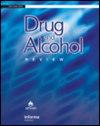A comparison of the United Kingdom, Australian and Japanese hangover product market
Abstract
Introduction
The use of products to prevent or reduce alcohol hangovers is increasingly popular. The aim of this study was to evaluate and compare the alcohol hangover product markets of the United Kingdom, Australia and Japan.
Methods
The website www.Amazon.com was searched, using the terms ‘hangover treatment’ and ‘hangover cure’, to identify hangover products sold in the United Kingdom, Australia and Japan. Dosage forms, ingredients and their amounts per serving were recorded and compared between the three countries.
Results
The market evaluations for the United Kingdom and Australia each revealed N = 19 hangover products, and 24 hangover products were found for Japan. The products from the three markets were quite distinct, with none of the hangover products being marketed in all three countries. The most popular ingredients in United Kingdom were potassium (63.2%), sodium (57.9%) and vitamin C (52.6%). The most common ingredients in Australia were vitamin B1, vitamin B6, vitamin B12 and sodium (all 47.4%). In Japan, curcumin (45.8%), L-ornithine (29.2%), vitamin C (20.8%) and vitamin B2 (20.8%) were the most popular ingredients. Most popular dosage forms also differed between the countries, with powders being most popular in the United Kingdom (42.1%), tablets in Japan (50.0%), and capsules (31.6%) and drinks (26.3%) in Australia.
Discussion and Conclusions
Both ingredients and dosage forms of hangover products differed between the United Kingdom, Australia and Japan. Products also differed from the United States, illustrating the importance of cross-cultural comparisons. As these are currently lacking, double-blind, placebo-controlled clinical trials are needed to demonstrate the efficacy and safety of marketed hangover products.

 求助内容:
求助内容: 应助结果提醒方式:
应助结果提醒方式:


